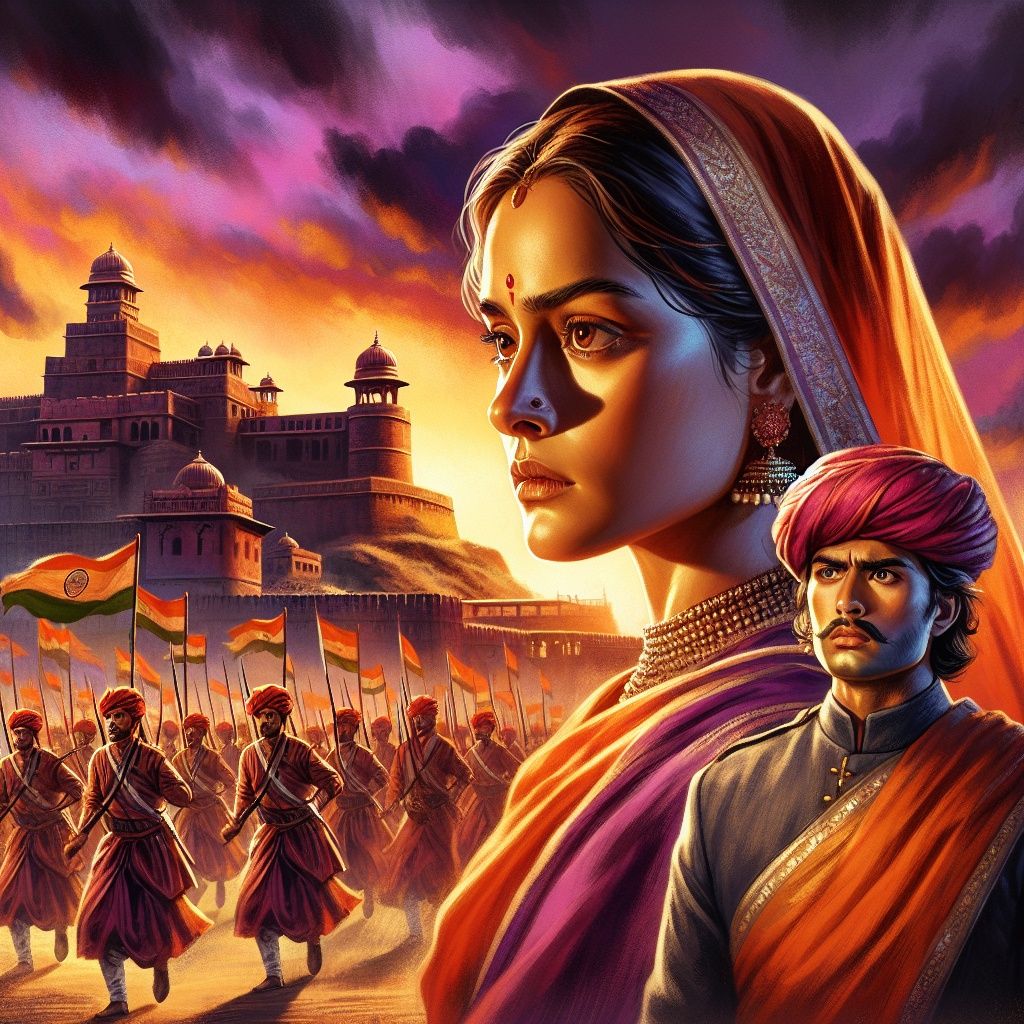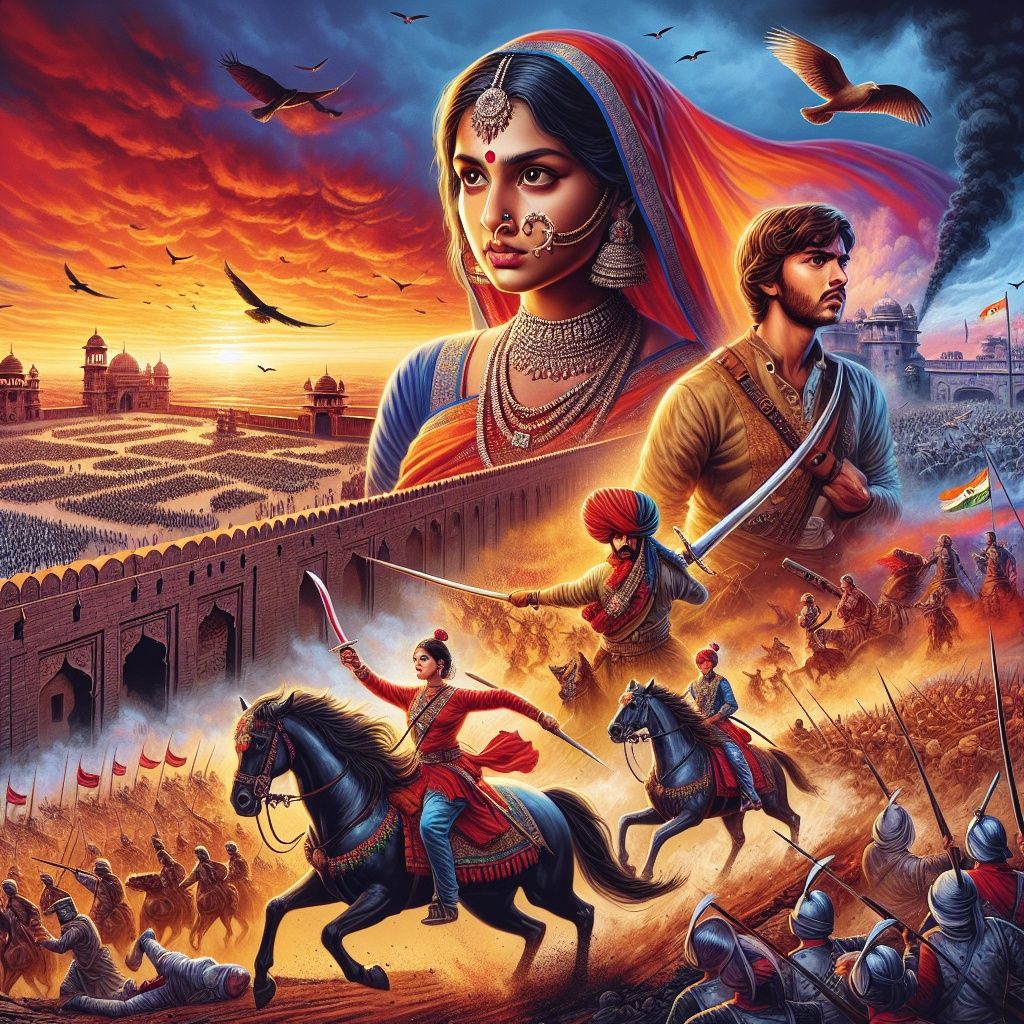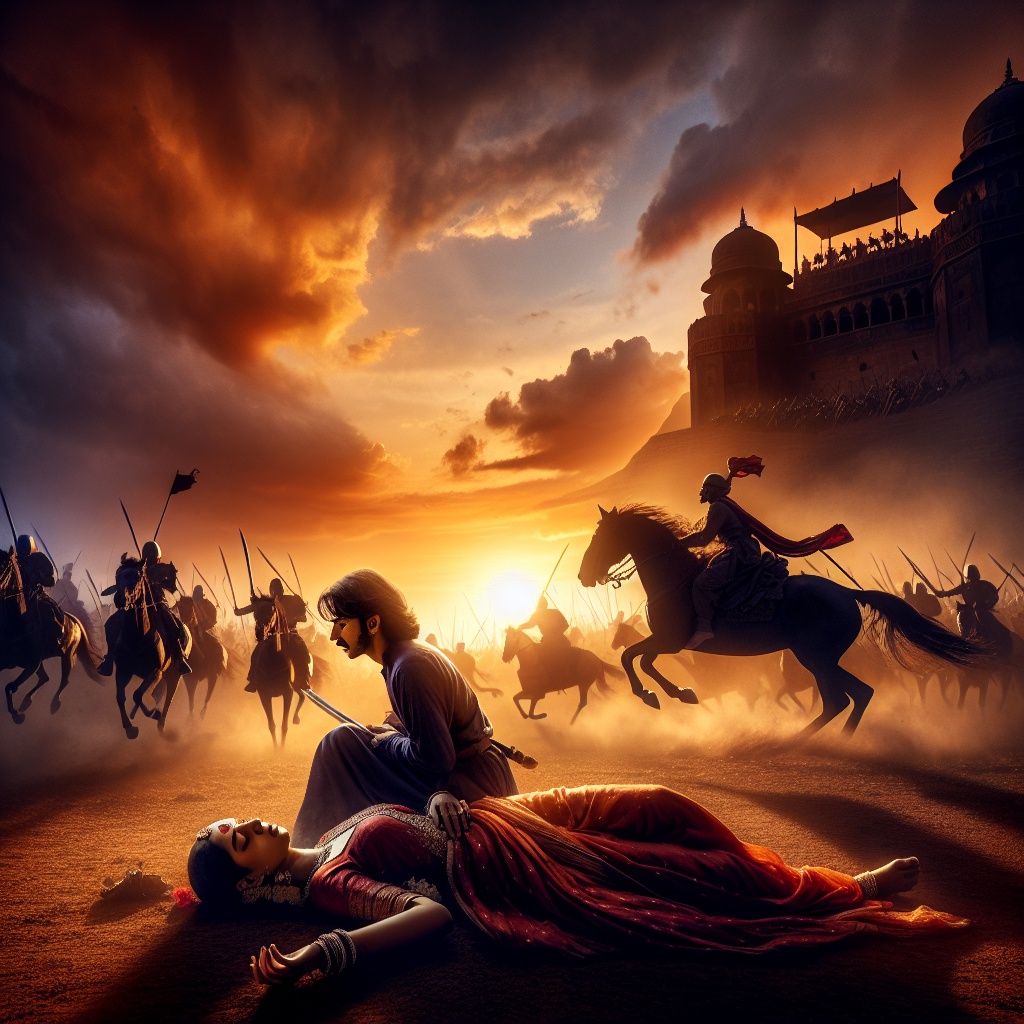14 Ianuarie 1435: Echoes of Panipat: A Mother's Sacrifice and the Unyielding Spirit of the Maratha Confederacy
In the shadow of the great Shaniwar Wada, the heart of the Maratha Confederacy, there stood a woman whose gaze was as fierce as the warriors training in the courtyard below. Her name was Veerangana, a widow of a Maratha soldier, and she was as much a part of the fort's soul as the stone and mortar that held it upright.
As the sun began its descent, painting the sky in hues of fire, Veerangana's thoughts wandered to the North, where her son, Vinayak, marched with the Maratha forces. She remembered the morning he left, the pride in his eyes, the resolve in his step. The image of him riding away had been etched into her heart, a bittersweet tattoo of love and fear.

The air was thick with tension, as news of the advancing Durrani Empire reached every ear. Ahmad Shah Abdali, a name spoken in hushed tones, led a formidable force that threatened to engulf the Maratha's northern aspirations. The Marathas, under the leadership of Sadashivrao Bhau, had mustered their might, knowing the fate of their empire hinged on the outcome of this clash. Veerangana had no inkling of the carnage that would unfold at Panipat, where the earth would drink the blood of thousands, where valor and tragedy would dance a macabre waltz. But in her heart, she felt a storm brewing, a premonition of sorrow that clung to her like a second skin. Days turned to weeks, and the third battle of Panipat was upon them. Vinayak stood in the ranks, the ground beneath his feet trembling with the drumbeat of war. He was young, but his eyes held the determination of a seasoned warrior. Beside him, his friend and comrade, Raju, clutched his sword, his knuckles white. They exchanged a glance, a silent vow to stand together until the end.

The battle commenced with the roar of cannons, the sky darkened by arrows. Vinayak and Raju fought with a ferocity that belied their years, their swords extensions of their will. Around them, the battlefield was a maelstrom of chaos and death, the air rent with the cries of the dying and the clash of steel. As the hours bled away, the tide turned against the Marathas. The Durrani cavalry, like a relentless wave, broke through their formations. Vinayak watched in horror as Raju fell, struck down by a mounted warrior. Enraged, he fought with renewed passion, a tempest of grief and fury. Back in Shaniwar Wada, Veerangana felt a sharp pain in her chest, a mother's bond fraying. She stumbled, her hands reaching out to an unseen force that threatened to steal her very breath. The walls of the fort, once a symbol of strength, now seemed to close in on her.

The battle raged until the sun dipped below the horizon, leaving a legacy of devastation. Vinayak lay among the fallen, his lifeblood seeping into the soil of Panipat. In his final moments, he thought of his mother, of the fort, of the empire he had sworn to protect. His was a sacrifice made in the name of freedom, a note in the tragic symphony of history. When the news of the defeat and the extent of the losses reached Shaniwar Wada, it was met with a silence that echoed through the halls. Veerangana, her heart shattered, did not weep. She stood tall, her sorrow a silent testament to the cost of war. Years passed, and the Maratha Confederacy, though weakened, endured. The tales of bravery and sacrifice at Panipat were woven into the fabric of Indian history, a reminder of the price paid for sovereignty. Veerangana never forgot her son, and in the quiet moments before dawn, she would whisper his name to the stars, ensuring that the memory of Vinayak, and of all those who fell at Panipat, would never fade. Their valor lived on, a flame undiminished by the passage of time, a beacon for future generations to remember and to honor.

The air was thick with tension, as news of the advancing Durrani Empire reached every ear. Ahmad Shah Abdali, a name spoken in hushed tones, led a formidable force that threatened to engulf the Maratha's northern aspirations. The Marathas, under the leadership of Sadashivrao Bhau, had mustered their might, knowing the fate of their empire hinged on the outcome of this clash. Veerangana had no inkling of the carnage that would unfold at Panipat, where the earth would drink the blood of thousands, where valor and tragedy would dance a macabre waltz. But in her heart, she felt a storm brewing, a premonition of sorrow that clung to her like a second skin. Days turned to weeks, and the third battle of Panipat was upon them. Vinayak stood in the ranks, the ground beneath his feet trembling with the drumbeat of war. He was young, but his eyes held the determination of a seasoned warrior. Beside him, his friend and comrade, Raju, clutched his sword, his knuckles white. They exchanged a glance, a silent vow to stand together until the end.

The battle commenced with the roar of cannons, the sky darkened by arrows. Vinayak and Raju fought with a ferocity that belied their years, their swords extensions of their will. Around them, the battlefield was a maelstrom of chaos and death, the air rent with the cries of the dying and the clash of steel. As the hours bled away, the tide turned against the Marathas. The Durrani cavalry, like a relentless wave, broke through their formations. Vinayak watched in horror as Raju fell, struck down by a mounted warrior. Enraged, he fought with renewed passion, a tempest of grief and fury. Back in Shaniwar Wada, Veerangana felt a sharp pain in her chest, a mother's bond fraying. She stumbled, her hands reaching out to an unseen force that threatened to steal her very breath. The walls of the fort, once a symbol of strength, now seemed to close in on her.

The battle raged until the sun dipped below the horizon, leaving a legacy of devastation. Vinayak lay among the fallen, his lifeblood seeping into the soil of Panipat. In his final moments, he thought of his mother, of the fort, of the empire he had sworn to protect. His was a sacrifice made in the name of freedom, a note in the tragic symphony of history. When the news of the defeat and the extent of the losses reached Shaniwar Wada, it was met with a silence that echoed through the halls. Veerangana, her heart shattered, did not weep. She stood tall, her sorrow a silent testament to the cost of war. Years passed, and the Maratha Confederacy, though weakened, endured. The tales of bravery and sacrifice at Panipat were woven into the fabric of Indian history, a reminder of the price paid for sovereignty. Veerangana never forgot her son, and in the quiet moments before dawn, she would whisper his name to the stars, ensuring that the memory of Vinayak, and of all those who fell at Panipat, would never fade. Their valor lived on, a flame undiminished by the passage of time, a beacon for future generations to remember and to honor.
The Third Battle of Panipat, fought on 14 January 1761, was a pivotal conflict between the Maratha Confederacy and the invading army of the Durrani Empire, led by Ahmad Shah Abdali. The battle, one of the largest in the 18th century, resulted in a decisive victory for the Afghan forces, with an estimated 60,000 to 70,000 troops killed. The extensive losses and the subsequent massacres of Maratha prisoners had a profound impact, significantly halting Maratha advances in the north and destabilizing their territories for roughly a decade. The battle's legacy is marked by the valour displayed by both sides and its portrayal in literature and popular culture, reflecting its enduring significance in Indian history.


Comments
Post a Comment